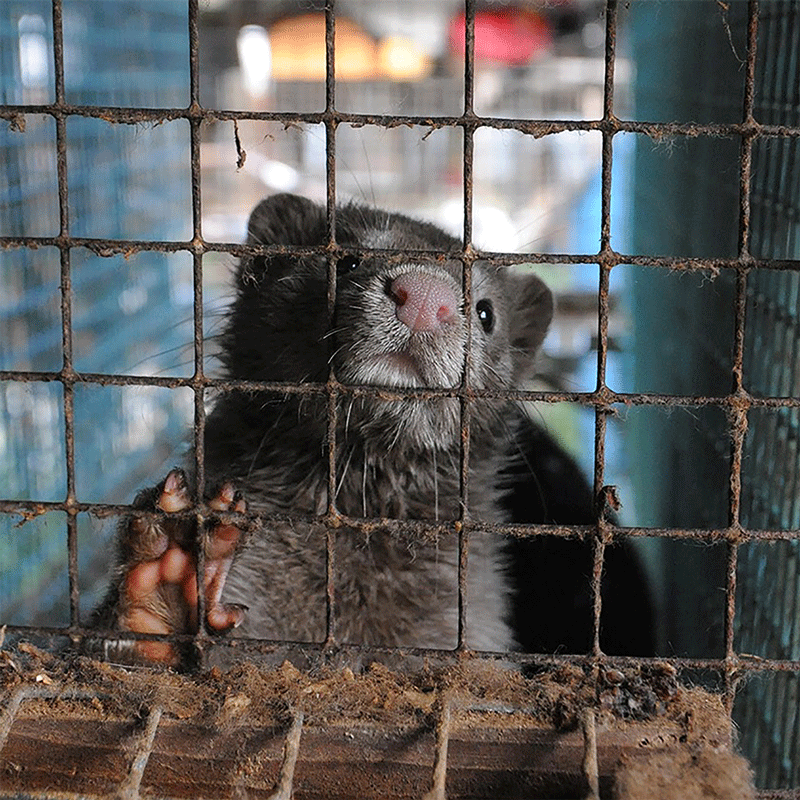Animals such as minks, foxes, chinchillas and raccoon dogs are routinely bred and raised on fur farms and killed after their first moulting.
The vast majority of animals kept for fur production are still essentially wild animals. They are fearful of humans and are fundamentally unsuitable for farming. Keeping domesticated animals in small cages and killing them solely or mainly because of the value of their fur cannot be legitimised either.
In contrast to domestication, the emphasis on fur farms has been to select for traits associated with pelt colour and quality, body size and litter size, with little attention paid to behavioural traits.
The welfare of animals farmed for fur is seriously compromised in current farming systems. Keeping wild predators in small cages results in numerous serious stress-related health problems, including infected wounds, missing limbs and cannibalism.
Scientific studies add further weight to the substantial body of evidence demonstrating that the needs of animals kept and killed for fur are not being met in current housing systems - and in fact cannot be met in any housing system.
In the wild, a fox would have a territory of several square kilometres, in a cage it has only a few square centimetres. Keeping typically solitary animals such as mink in close proximity to one another can be distressing.
To cope with these unnatural situations, animals are known to fight and self-harm. Such conditions do not allow the animals to perform natural behaviours, such as swimming or digging.
Finally, having endured tough conditions during their short life, animals are slaughtered in a variety of violent ways, such as asphyxia through gassing, or by electrocution.
SWISS CITIZENS CONSIDER THAT KILLING ANIMALS FOR FUR PRODUCTS IS WRONG
MEMBER STATES HAVE TOTALLY OR PARTIALLY BANNED OR STRICTLY REGULATED FUR FARMING
CZECH CITIZENS DON'T AGREE WITH KILLING ANIMALS FOR FUR
WHAT DOES THE PUBLIC THINK?
The breeding of animals for the purposes of fur production is opposed by many EU citizens, who believe that it is unacceptable, unnecessary and unethical to keep and kill animals for the production of a non-essential product for which there are many warm and humane alternatives.
The publicʼs long-standing opposition to fur farming and the changed ethical perception of animals is reflected by the law in an increasing number of countries.
POLICY - CURRENT STATE OF PLAY
Animals farmed for fur fall within the scope of Directive 98/58/EC of 20 July 1998 concerning the protection of animals kept for farming purposes (the “General Farming Directive”). According to this Directive, Member States may apply stricter provisions for the protection of animals kept for farming purposes than those laid down in the Directive.
To date, 18 Member States have totally or partially banned or strictly regulated fur farming, sometimes with phasing-out periods. The most recent countries to join the list were Ireland, where in March 2022 a bill to ban fur farming passed the final stages of the parliamentary process, and Italy, which decided to ban fur farming for good as of 1 January 2022.
It is important to note, nonetheless, that the sale of fur products continues in countries which have banned fur farms and there is no evidence to suggest that European countries with fur farming bans are considering outlawing its sales. Therefore, while the practice has been banned in certain places, the ability to purchase fur enables animal welfare violations elsewhere.
During the 28-29 June 2021 meeting of the [AGRIFISH] Council, the Netherlands and Austria presented an information note on fur farming, supported by a further ten Member States calling on the European Commission to investigate the possibility for an EU ban on fur farming based on animal welfare, veterinary-public health and ethical considerations.
In the recently adopted Report on the EU Biodiversity Strategy, the European Parliament also acknowledged that fur production can significantly compromise animal welfare and increase the susceptibility to infectious diseases including zoonoses.
The annex to Directive 98/58/EC provides that:
21. No animal shall be kept for farming purposes unless it can reasonably be expected, on the basis of its genotype or phenotype, that it can be kept without detrimental effect on its health or welfare.
There is considerable evidence to the effect that fur farming is inherently cruel and cannot be practised in a manner that ensures compliance with this provision. Unlike for other species farmed for food production, there are no alternative housing systems that can improve the welfare of fur animals.












